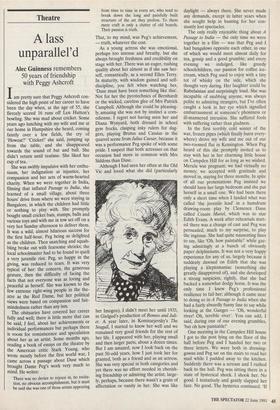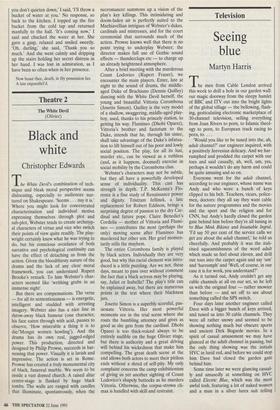Theatre
A lass unparallel'd
Alec Guinness remembers 50 years of friendship with Peggy Ashcroft
Iam pretty sure that Peggy Ashcroft con- sidered the high point of her career to have been the day when, at the age of 55, she fiercely scored 16 runs off Len Hutton's bowling. She was mad about cricket. Some years ago lunching with my wife and me at our home in Hampshire she heard, coming faintly over a few fields, the cry of 'Howzat?"Cricket!' she said, jumping up from the table, and she disappeared towards the sound of bat and ball. She didn't return until teatime. She liked her cup of tea. She was swiftly impulsive with her enthu- siasm, her indignation at injustice, her compassion and her acts of warm-hearted charity. When we were together in India, filming that inflated Passage to India, she learned of a small village, about three hours' drive from where we were staying in Bangalore, in which the children had little or nothing to play with. She promptly bought small cricket bats, stumps, balls and various toys and with me in tow set off on a very hot Sunday afternoon to deliver them. It was a wild, almost hilarious success for the first half-hour, Peg being as delighted as the children. Then snatching and squab- bling broke out with fearsome shrieks; the local schoolmaster had to be found to quell a very juvenile riot. Peg, so happy in the giving, was reduced to tears. It was very typical of her: the concern, the generous gesture, then the difficulty of facing the facts that not everyone was as loving and peaceful as herself. She was known to the few extreme right-wing people in the the- atre as the Red Dame, but her political views were based on compassion and fair- mindedness rather than any ism.
The obituaries have covered her career fully and well; there is little more that can be said, I feel, about her achievements or individual performances but perhaps there Is room for reminiscence and speculation about her as an artist. Some months ago, reading a book of essays on the theatre by the American critic Stark Young, who wrote mostly before the first world war, I came across a passage about Duse which brought Dame Peg's work very much to mind. He writes:
There was no device to rejoice in, no recita- tion, no obvious accomplishment, but it must be said she was one of those artists appearing from time to time in every art, who tend to break down the long and painfully built structure of the art they profess. To them mere craft is only a clutter of old boards. Their passion is truth.
That, to my mind, was Peg's achievement, — truth, whatever the cost.
As a young actress she was emotional, perhaps too intense and breathy, but she always brought freshness and credibility on stage with her. There was an eager, rushing quality about her almost as if she saw her- self, romantically, as a second Ellen Terry. In maturity, with wisdom gained and self- discipline, you felt when watching her, touse must have been something like this'. Not for her the pyrotechnics of Bernhardt or the wicked, careless glee of Mrs Patrick Campbell. Although she could be pleasing- ly. amusing she was not by instinct a com- edienne. I regret not having seen her and Diana Wynyard, both dressed in school gym frocks, clasping inky rulers for dag- gers, playing Brutus and Cassius in the quarrel scene from Julius Caesar, because it was a performance Peg spoke of with some pride. I suspect that both actresses on that occasion had more in common with Mrs Siddons than Duse.
Although I had seen her often at the Old Vic and loved what she did (particularly her Imogen), I didn't meet her until 1935, in Gielgud's production of Romeo and Juli- et. A year later, in Komisarjevsky's The Seagull, I started to know her well and we remained very good friends for the rest of her life. I appeared with her, playing small and then larger parts, about a dozen times. But I am amazed, now I look back on the past 50-odd years, how I just took her for granted, both as a friend and as an actress. She was very special in both categories and yet there was no effort needed in cherish- ing friendship or admiring the artist; large- ly, perhaps, because there wasn't a grain of affectation or vanity in her. She was like daylight — always there. She never made any demands, except in latter years when she sought help in hunting for her con- stantly lost spectacles.
The only really enjoyable thing about A Passage to India — the only time we were together in a film — was that Peg and I had bungalows opposite each other, in one of which we would meet almost daily for tea, gossip and a good grumble; and every evening we indulged, like greedy schoolchildren, our passion for coffee ice- cream, which Peg used to enjoy with a tiny tot of whisky on the side, which she thought very daring. Her laughter could be Rabelaisian and surprisingly loud. She was incapable of snubbing anyone, was always polite to admiring strangers, but I've often caught a look in her eye which signalled embarrassment at someone's phoniness or ill-mannered intrusion. She suffered fools with suffering rather than gladness.
In the first terribly cold winter of the war, frozen pipes (which finally burst every- where) drove my wife and me out of our two-roomed flat in Kensington. When Peg heard of this she promptly invited us to stay with her in her charming little house on Campden Hill for as long as we wished. Merula was pregnant; we had virtually no money; we accepted with gratitude and moved in, staying for three months. In spite of all our protestations Peg insisted we should have her large bedroom and she put herself in a small one. We had been there only a short time when I landed what was called 'the juvenile lead' in a humdrum drawing-room play by Clemence Dane called Cousin Muriel, which was to star Edith Evans. A week after rehearsals start- ed there was a change of cast and Peg was persuaded, much to my surprise, to play the ingenue. She had quite nauseating lines to say, like 'Oh, how paintable!' while gaz- ing admiringly at a bunch of obviously paper delphiniums. It was not a very happy experience for any of us, largely because it suddenly dawned on Edith that she was playing a kleptomaniac (something she greatly disapproved of), and she developed a strong suspicion, rightly, that she had backed a somewhat dodgy horse. It was the only time I knew Peg's professional resilience to fail her; although it came near to doing so in A Passage to India when she had a fairly absurdly funny line to say while looking at the Ganges — 'Oh, wonderful river! Oh, terrible river'. You can add, I said, during one of our evening grumbles, `but oh how paintable!'
One morning in the Campden Hill house I got to the post lying on the floor of the hall before Peg and I handed her two or three letters. We were both in dressing- gowns and Peg sat on the stairs to read her mail while I padded away to the kitchen. Suddenly there was a scream and I rushed back to the hall. Peg was sitting there in a state of hysterical shock. I shook her. No good. I tentatively and gently slapped her face. No good. The hysterics continued. 'If you don't quieten down,' I said, 'I'll throw a bucket of water at you.' No response, so back to the kitchen. I topped up the fire bucket from the cold tap and returned manfully to the hall. 'It's coming now,' I said and chucked the water at her. She gave a gasp, relaxed and smiled sweetly. `Oh, darling,' she said, 'Thank you so much.' And she went calmly and dripping up the stairs holding her secret distress in her hand. I was lost in admiration, as I have been so often when in her presence.
Now boast thee, death, in thy possession lies A lass unparallel'd.



























































 Previous page
Previous page